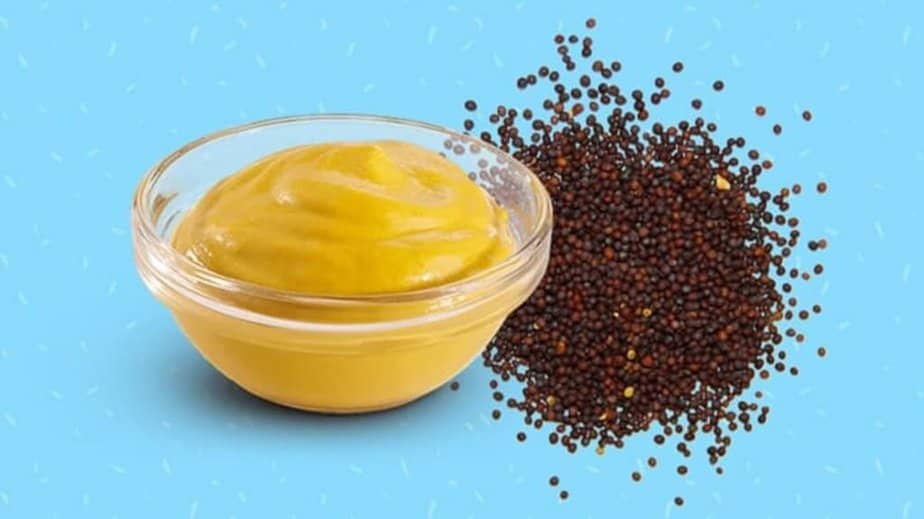Often you’ll see in Chinese restaurants hot mustard is served along with sweet duck sauce. For noodle lovers, there isn’t a better appetizer than Chinese spicy mustard, especially with crunchy fried noodles.
Certainly, hot chili oil is the most popular hot sauce used in Chinese cuisine. But there’s nothing like using a combination of Chinese hot mustard and duck sauce to top off fried wonton, egg roll, or a piece of roasted pork.
This article examines the best hot mustard substitute to use in a pinch, and also a little about its uses in cooking, flavor profile, and benefits.
What Is Chinese Hot Mustard?
Chinese hot mustard is a condiment made by mixing dry mustard powder with water. There are a few varieties of hot mustard with additional ingredients like sesame oil, rice vinegar, turmeric, or starch which reduces its spiciness and taste to some extent.
Chinese mustard has a horseradish-like heat resulting from the chemical reactions occurring while mixing the mustard powder with water. It’s hot because of myrosinase, an enzyme that causes heat when crushed mustard seeds are mixed with a liquid.
Basically, it’s a hot mustard sauce used as an appetizer, a spicy condiment that provides pungent heat. This spicy mustard paste is commonly served at Chinese restaurants everywhere as an appetizer like chili oil, hot sauces, dips, or soups.
This spicy sauce is a gluten-free vegan or vegetarian condiment; however, some of the added ingredients might contain gluten.
Buy this premade condiment from the Asian spices section of a supermarket or grocery store, also available from online vendors. It comes in different labels like “Hot Mustard”, Chinese Mustard Sauce”, “Chinese-Style Hot Mustard”, or “Chinese Spicy Mustard.” If this condiment is not available in your area then make it yourself at home or use a Chinese hot mustard substitute.
What Does Hot Mustard Taste Like?
Chinese hot mustard has a spicy, pungent flavor that gives your taste buds a strong sense of horseradish-like heat. The muscular aroma of this mustard sauce is also hot and it has sinus-clearing properties. Fresh and well-preserved brown mustards have maximum flavor punch with heat and tanginess.
How Is Chinese Mustard Used In Cooking?
Generally, Chinese mustard, powdered and converted into a sauce-like consistency, is not used in cooking. Only whole mustard seeds and mustard green are used in Chinese cuisines. Instead, it is used as condiments to spice up meat and appetizers. In a Chinese restaurant, it is served in a small bowl that you use as a dip or sauce.
What Is A Good Substitute For Chinese Mustard?
What to use in place of Chinese mustard powder? Don’t bother if you don’t have it. We have listed below the best Chinese hot mustard substitutes you can use.
Homemade Chinese Mustards
It is seemingly simple and easy to make Chinese hot mustard at home and the basic ingredients you need are dry mustard powder and cold water. Stir and blend ¼ cup mustard powder and ¼ cup water in a bowl and keep the bowl covered with a lid for 45 minutes. Here you have your hot mustard ready for serving or store it in a tightly closed jar. Note, you can tone down the heat of this mustard sauce by adding ½ teaspoon of olive or mustard oil to this mixture.
Wagarashi
Wagarashi is the Japanese version of Chinese mustard and both have identical flavor and texture. It’s made with brown mustard and water like Chinese mustard, thus they are equally spicy and hot. Therefore, Wagarashi is a perfect alternative to Chinese mustard and both can be used interchangeably in the same manner.
Spicy Brown Mustard
Spicy brown mustard is the American cousin of Chinese mustard, and both are made with brown mustard. As you know, brown mustard is stronger than both white and yellow varieties of mustard.
Most brands of spicy brown mustard on sale contain vinegar that adds a tart flavor in addition to heat still it’s a good substitute for Chinese mustard. But the brown mustard variety produced in China is hotter than its variants produced in the US.
English mustard
A combination of brown and white mustard powder is used to make English mustard. It’s a decent replacement for Chinese mustard as it has a similar flavor and texture. However, most brands of English mustard sauce contain starch for thickening and that dilutes the taste by lessening the heat.
Dijon mustard
Dijon mustard is the traditional mustard of France, named after the town of Dijon in Burgundy. Mostly, it contains brown mustard and one or more additional ingredients like white wine and wine vinegar. Dijon mustard has the pungent heat of mustard and a mild tartness of the vinegar. It isn’t as pungent as Chinese hot mustard yet a decent substitution to use in a pinch.
Horseradish
Horseradish is a root vegetable known for its pungent odor and spicy flavor akin to mustard. Importantly, it is not a mustard variety but belongs to the mustard family of plants. Horseradish contains the same enzymes found in mustard thus both have a reasonably identical flavor and heat. Prepared horseradish is a workable substitute for Chinese hot mustard when you don’t have other better replacement options like Wagarashi or spicy brown mustard.
Final Thoughts
Chinese hot mustard is a spicy condiment made from dry mustard powder and water, sometimes with added sesame oil, rice vinegar, turmeric, or starch.
Suitable substitutes include homemade Chinese mustard (made with mustard powder and water), Wagarashi (Japanese equivalent), Spicy Brown Mustard (American variant with vinegar), English mustard (a mix of brown and white mustard powders), Dijon mustard (French mustard with wine or vinegar), and horseradish (a root vegetable with similar pungency). These substitutes vary in heat and flavor but offer similar spicy profiles.
Related articles:
- What is a good substitute for powdered mustard?
- What can I use in place of dry mustard?
- What to do when I don’t have black mustard seed?
